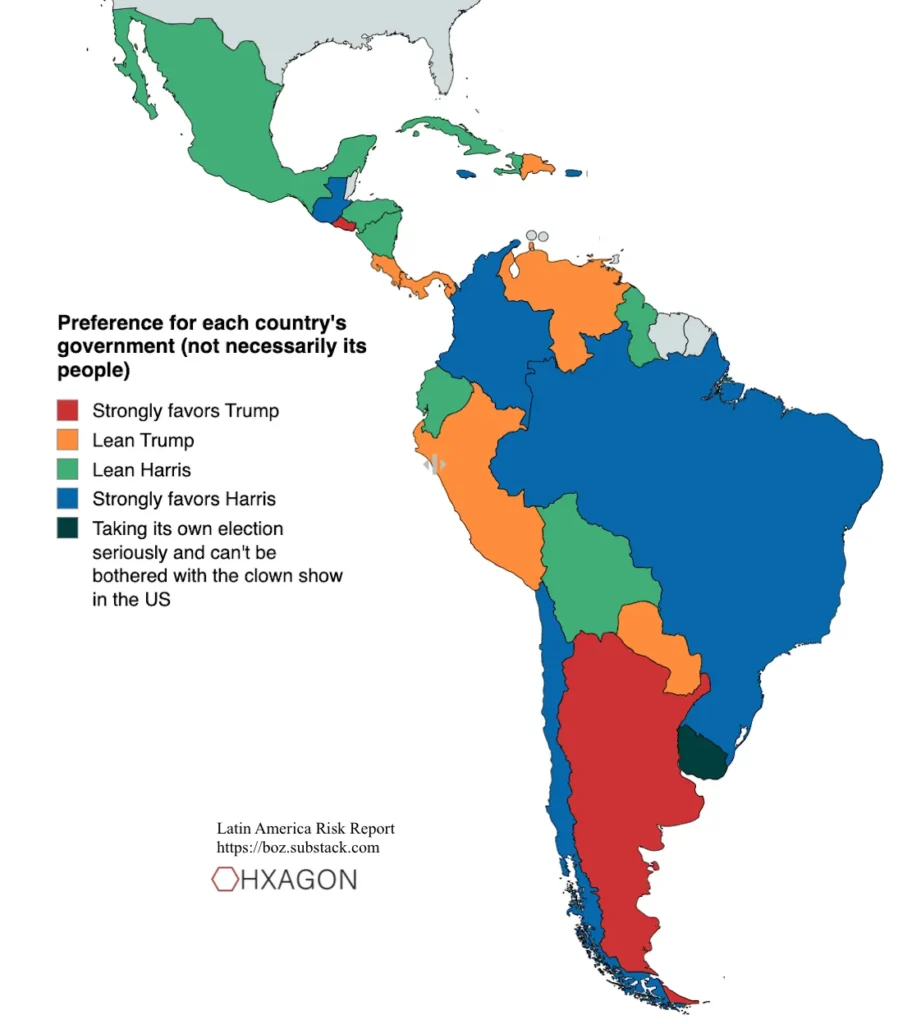Harris vs. Trump on Venezuela Policy
We've already looked at Venezuela within the U.S. presidential election campaign political discourse. Let's now see what may be in store for la patria depending on who wins


Editor’s note: Boz shot this post intended for his paid subscribers to his whole Substack list. We decided to snatch it and bring it here to add to the Venezuela in the U.S. elections conversation. If you like what you read, here you can subscribe to Boz’s Latin America Risk Report.
Harris’s policy in three words: Stability, inertia, and stagnation.
Trump’s policy in three words: Chaos, alternation, and transactions.
If Kamala Harris wins the U.S. election, next year her policy is going to look very similar to President Biden’s. There may be some small tweaks around the margins, but the broad policy will be maintaining some form of pressure via individual sanctions, reducing reliance on sectoral sanctions, engaging in negotiations over critical issues, and gently pushing for democracy without any radical actions that would destabilize the country. It will also be a policy that runs a lot on inertia, simply continuing what’s there rather than a radical rethink. Under Harris, Venezuela is not going to be the priority in foreign policy or even in Latin America policy. That means a Harris election continues some limited pressure on Maduro but does not directly threaten his stability in office.
If Donald Trump wins the U.S. election, he will consider and attempt a much wider range of options. Those policies will then change dramatically over the course of his presidency. Trump will consider everything from returning to a “maximum pressure” of strong sectoral sanctions to, at the other extreme, a negotiation and reconciliation with Maduro in exchange for oil deals. We would likely see both extremes of policy measures during a four year Trump term in office, starting with pressure and flip flopping to deal-making. It would look somewhat similar to his first term’s North Korea policy.
Venezuela’s opposition is not going to be thrilled with either of these policies. Neither candidate represents a bold pro-democracy shift in the country. Harris would continue the current pressure that exists under Biden, but it will not be enough to tip the balance of power. Trump might briefly increase pressure, also not enough to really harm Maduro though potentially enough to increase the misery of the average Venezuelan. Then he will shift towards a deal with Maduro in a way that harms the opposition’s opportunities for change.
Maduro, who is looking for ways to negotiate with the U.S. and taking hostages for leverage, likely prefers the potential Trump term to the continued policy under Harris. The Biden-Harris administration has given Maduro very little to work with. Trump would either prove to be the ultimate foil, allowing Maduro to shore up his anti-imperial bonafides domestically and internationally, or he’d be negotiating and cutting deals that would reduce the sanctions threat. Either is better for Maduro (though not Venezuela) than the status quo.
One final note: Both candidates say they will not use military force in Venezuela. Harris said so in a recent interview. Trump has threatened to bomb cartels in Mexico, but not Venezuela. Trump did suggest using military force in Venezuela during the 2019 crisis according to John Bolton, but it’s unclear how serious or whether that threat would be considered in 2025 or beyond. I do not expect either to seriously consider military options.
Trump vs. Harris in LatAm
Follow the link for the explanation of the map below.

Caracas Chronicles is 100% reader-supported.
We’ve been able to hang on for 22 years in one of the craziest media landscapes in the world. We’ve seen different media outlets in Venezuela (and abroad) closing shop, something we’re looking to avoid at all costs. Your collaboration goes a long way in helping us weather the storm.
Donate




